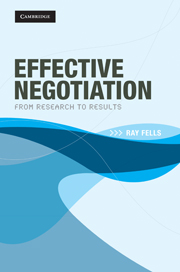Book contents
- Frontmatter
- Contents
- Acknowledgements
- 1 An introduction to negotiation
- 2 The essence of negotiation
- 3 Being strategic
- 4 The process of negotiation
- 5 Managing a negotiation
- 6 Dealing with differences
- 7 Exploring options
- 8 The end-game exchange
- 9 Negotiating on behalf of others
- 10 Cross-cultural negotiations
- Appendix 1 A preparation checklist
- Appendix 2 A negotiation review checklist
- Appendix 3 Self-reflection tools
- Appendix 4 The Strategy Framework
- Appendix 5 The Nullarbor Model
- Appendix 6 Managing competitiveness
- Appendix 7 Managing workplace negotiations
- Appendix 8 Managing a business negotiation
- Appendix 9 A culture checklist
- References
- Index
2 - The essence of negotiation
- Frontmatter
- Contents
- Acknowledgements
- 1 An introduction to negotiation
- 2 The essence of negotiation
- 3 Being strategic
- 4 The process of negotiation
- 5 Managing a negotiation
- 6 Dealing with differences
- 7 Exploring options
- 8 The end-game exchange
- 9 Negotiating on behalf of others
- 10 Cross-cultural negotiations
- Appendix 1 A preparation checklist
- Appendix 2 A negotiation review checklist
- Appendix 3 Self-reflection tools
- Appendix 4 The Strategy Framework
- Appendix 5 The Nullarbor Model
- Appendix 6 Managing competitiveness
- Appendix 7 Managing workplace negotiations
- Appendix 8 Managing a business negotiation
- Appendix 9 A culture checklist
- References
- Index
Summary
The previous chapter suggested that negotiation is like DNA with some critical elements ‘hard wired’ into the process. This chapter examines the two strands of our negotiation DNA: the parties and the key elements that hold them together, namely reciprocity, trust, power, information exchange, ethics and outcome.
Parties to the negotiation
The two strands of our negotiation DNA represent the two parties, each with its objectives and priorities. Most business negotiations are conducted by individuals acting on behalf of organisations so even when these negotiations are one-on-one, the ‘shadow’ of the organisation is often in the background. When thinking about the ‘party’ to a negotiation, it is important to consider the interactions between the other party's negotiators and those who they represent. These ‘intra-party dynamics’ are explored in Chapter 9.
But what of the individual negotiator? One characteristic of negotiation is that it is ‘messy’, one reason being because people are different. We each try to do things in different ways and we react differently to what is happening around us or to us. Our personality impacts on how we negotiate, but how much?
Do I make a difference?
As we get older our personalities become more set, so it would be of little help to learn that a personality different from ours is necessary for effective negotiation. Fortunately, attempts to identify the impact of personality on negotiation effectiveness have not found any significant, practical effects (Bazerman et al., 2000).
Information
- Type
- Chapter
- Information
- Effective NegotiationFrom Research to Results, pp. 8 - 38Publisher: Cambridge University PressPrint publication year: 2009
